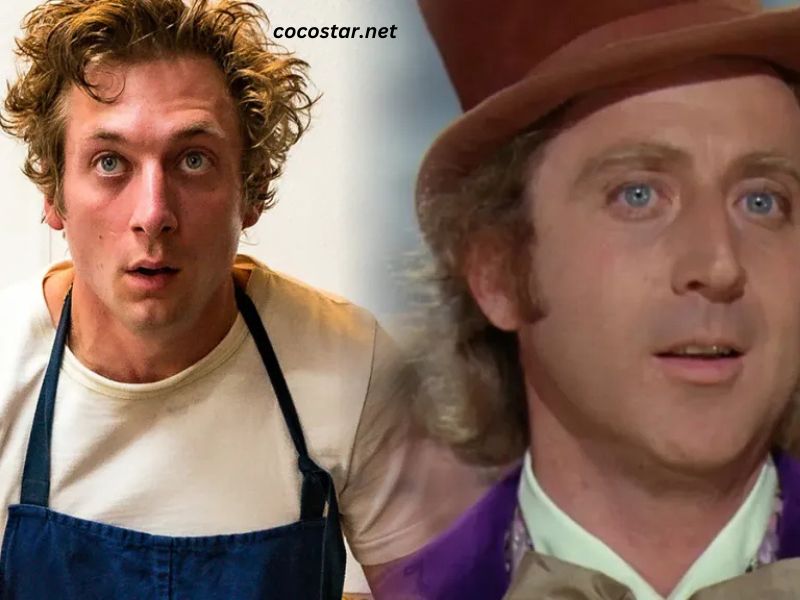When we think of two individuals in the acting world who have left an indelible mark on television, Jeremy Allen White and Gene Wilder are certainly names that come to mind. Though they belong to different eras and have had vastly different careers, both actors share an unmatched talent for capturing the human experience on screen, whether through dramatic or comedic roles. In this article, we will explore the careers and legacies of these two legendary actors—Jeremy Allen White, the rising star of the modern era, and Gene Wilder, one of Hollywood’s most beloved comedic actors.
Jeremy Allen White: The Rise of a Modern Talent
Jeremy Allen White’s career has flourished in recent years, especially with his standout role in the critically acclaimed television series Shameless. Born on February 17, 1991, in Brooklyn, New York, White showed an interest in acting from a young age. He studied at the famous School of American Ballet before moving on to the acting world. However, his breakthrough came when he was cast as Phillip “Lip” Gallagher in Shameless (2011-2021), a role that would make him a household name.
The Role of Lip Gallagher
In Shameless, Jeremy Allen White portrayed Lip Gallagher, the intelligent but troubled eldest son in a dysfunctional working-class family. The show, which focused on the chaotic lives of the Gallagher family, provided White with the opportunity to showcase his range as an actor. Over the course of eleven seasons, White’s portrayal of Lip, a character who struggles with addiction, love, and the challenges of growing up in a broken home, earned him widespread praise. His ability to convey deep emotion while also bringing levity to the character’s often difficult circumstances was a key part of why audiences connected with Lip.
White’s success as Lip Gallagher was not just about playing a complex character, but also about the strong relationships he formed with the rest of the Shameless cast. The dynamic between White and his co-stars, especially Emmy Rossum (who played Fiona Gallagher), allowed him to develop his skills and grow as an actor, making his journey on the show one of the most compelling narratives in recent television history.
Beyond Shameless: New Opportunities in Film and TV
Since Shameless concluded, Jeremy Allen White has transitioned to a variety of exciting new projects. He starred in The Bear (2022), a critically acclaimed television series in which White plays Carmen “Carmy” Berzatto, a talented young chef who returns home to run his family’s struggling sandwich shop. In The Bear, White’s performance was lauded for its intensity and vulnerability, further cementing his status as one of the most versatile actors of his generation. His ability to portray a character under immense stress, trying to balance his family’s expectations with his passion for cooking, showcased a more mature side of his acting prowess.
Jeremy Allen White’s career trajectory shows great promise, with more opportunities on the horizon. He has proven that he is not just a talented actor in comedic or dramatic roles, but also someone who can seamlessly transition between genres. Whether on television or in film, White’s career continues to grow, and it will be exciting to see where his acting journey takes him next.
Gene Wilder: A Comedic Icon
Gene Wilder, born Jerome Silberman on June 11, 1933, in Milwaukee, Wisconsin, was one of the most influential comedic actors of the 20th century. While Jeremy Allen White’s career is just beginning to reach its peak, Wilder’s impact on film and comedy has already left an everlasting legacy. He was an actor, screenwriter, director, and author, best known for his quirky performances and his ability to infuse humor with depth, often in roles that became iconic in cinematic history.
Wilder’s Iconic Role as Willy Wonka
One of Gene Wilder’s most beloved roles is that of Willy Wonka in Willy Wonka & the Chocolate Factory (1971). Based on Roald Dahl’s novel Charlie and the Chocolate Factory, Wilder’s portrayal of the eccentric chocolate maker became one of the most memorable performances in cinema. While the film itself was initially a commercial failure, it gained immense popularity over the years, in large part due to Wilder’s distinctive and enigmatic performance. His portrayal of Wonka—strange, wise, and simultaneously frightening and endearing—set a new standard for how a character could simultaneously be a source of both comedy and mystery.
Wilder’s ability to balance humor with dark undertones was a signature of his work. He made Willy Wonka a character that both children and adults could appreciate, albeit for different reasons. For children, he was a magical figure, full of wonder and excitement. For adults, there was an underlying sense of melancholy and complexity in the character, which made him all the more fascinating.
The Mel Brooks Collaborations: Blazing Saddles and Young Frankenstein
Another major highlight of Gene Wilder’s career was his collaborations with the legendary director and writer Mel Brooks. Wilder’s performances in Blazing Saddles (1974) and Young Frankenstein (1974) solidified him as a comedic genius.
In Blazing Saddles, Wilder played the role of the outlaw Jim, who teams up with a black sheriff (played by Cleavon Little) to confront corruption and racism in the Old West. The film was a biting satire that tackled serious social issues while maintaining its comedic tone. Wilder’s performance was both hilarious and thought-provoking, proving his versatility as an actor.
In Young Frankenstein, a parody of classic horror films, Wilder played the role of Dr. Frederick Frankenstein, the grandson of the infamous Dr. Victor Frankenstein. The film was a huge success and remains one of Brooks’ most popular films. Wilder’s comedic timing and impeccable delivery made him the perfect fit for the role, and his chemistry with the rest of the cast, including Teri Garr, Madeline Kahn, and Marty Feldman, made the film a comedic masterpiece.
Wilder’s Later Career: A Transition to Directing and Writing
Later in his career, Gene Wilder turned his attention to writing and directing. He directed and starred in several films, including The Woman in Red (1984), a romantic comedy in which he played a middle-aged man who falls in love with a young woman. While his directorial ventures were not as commercially successful as his acting roles, they showcased his ability to create rich, character-driven narratives with humor and sensitivity.
Wilder also continued to act in a variety of films throughout the 1980s and 1990s, including See No Evil, Hear No Evil (1989) and Another You (1991), both of which were comedic hits. However, as time went on, Wilder began to step back from acting, focusing more on his writing, including his memoirs and a series of novels.
The Connection Between Jeremy Allen White and Gene Wilder
Though Jeremy Allen White and Gene Wilder come from different eras of filmmaking, there are certain similarities that can be drawn between them. Both actors have been praised for their remarkable ability to balance humor and pathos in their performances. White’s work on Shameless and The Bear shows that he can master dramatic roles, while also infusing them with humor and nuance. Similarly, Wilder’s greatest strength was his ability to play characters that were both funny and deeply human, allowing audiences to connect with them on an emotional level.
Both actors are also known for their versatility. While White is still building his career and expanding his range, Wilder’s career spanned numerous genres, from broad comedy to more serious, introspective roles. Both actors are able to draw on their understanding of human nature to create characters that feel real and relatable, whether they are struggling with addiction, family dynamics, or even eccentricity.
Another connection between White and Wilder is their ability to work with talented ensemble casts. Just as White’s relationships with his Shameless castmates were crucial to the show’s success, Wilder’s collaborations with actors like Cleavon Little, Peter Boyle, and Marty Feldman made his films some of the most iconic comedies of all time.
Conclusion
While Jeremy Allen White is still a young actor on the rise, his talent has already made a significant impact on television and film. With his impressive range and emotional depth, he has proven that he is capable of taking on both dramatic and comedic roles. Meanwhile, Gene Wilder’s career is a testament to the power of comedy and the importance of blending humor with human emotion. Through his memorable roles, he shaped the way we think about comedy, leaving a legacy that will continue to inspire future generations of actors.
Though they come from different generations, both actors share an ability to capture the essence of humanity in their performances. Whether through the heartfelt struggles of a troubled young man or the eccentricities of a beloved chocolate factory owner, Jeremy Allen White and Gene Wilder have both contributed to the fabric of film and television in ways that will continue to be appreciated for years to come. Their talent, versatility, and enduring appeal are proof that great acting transcends time and genre, leaving an unforgettable mark on audiences everywhere.



